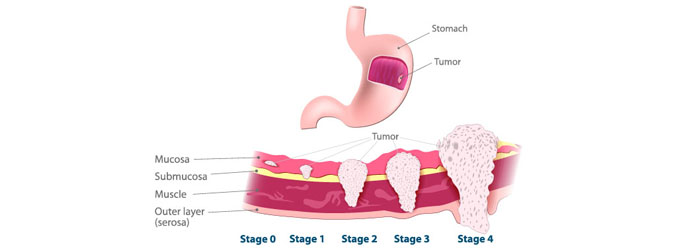
PROF. (Dr.) HIMADRI SENGUPTA
MBBS, MS, FIAGES, FMAS
CONSULTANT SURGEON
General, GI, Laparoscopic & Oncosurgeon
Ex - Head Of The Department Of Surgery
STOMACH
The stomach is is in the upper abdomen. It is part of the gastrointestinal tract (the gut). It lies in the upper part of the abdomen, just below the ribs. When we eat, food passes down the oesophagus (gullet) into the stomach.
The stomach makes acid and some enzymes (chemicals) which help to digest food. The muscles in the wall of the stomach contract to mix up the food with the acid and enzymes.
Food then passes into the duodenum (the first part of the small intestine). Here food mixes with more enzymes which come from the pancreas and lining of the gut. The enzymes digest (break down) the food.
Digested food is then absorbed into the body from the small intestine.
Adenocarcinoma of the stomach
an most cases, stomach cancer begins from a cell which is on the inside lining of the stomach (the mucosa). This type of stomach cancer is called adenocarcinoma of the stomach. As the cancer cells multiply:
The tumour may invade deeper into the wall of the stomach. In time, it may pass through the wall of the stomach and invade nearby organs such as the pancreas or liver.
The tumour may spread up or down the stomach into the oesophagus (gullet) or small intestine.
Some cells may break off into the lymph channels or bloodstream. The cancer may then spread to nearby lymph nodes or spread to other areas of the body (metastasise).
Other types of stomach cancer
There are some less common and rare types of stomach cancer which include:
Lymphomas. These are cancers which arise from the lymphatic tissue within the wall of the stomach.
Sarcomas. These are cancers which arise from the muscle or connective tissue within the wall of the stomach.
Carcinoid Cancers. These are cancers which arise from cells in the stomach lining which make hormones.
The rest of this leaflet only discusses adenocarcinoma of the stomach.
What causes stomach cancer (adenocarcinoma of the stomach)?
A cancerous tumour starts from one abnormal cell. The exact reason why a cell becomes cancerous is unclear. It is thought that something damages or alters certain genes in the cell. This makes the cell abnormal and multiply out of control.
Many people develop stomach cancer for no apparent reason. However, certain risk factors increase the chance that stomach cancer may develop. These include:
Ageing. Stomach cancer is more common in older people. Most cases are in people over the age of 55.
Having a type of anaemia called pernicious anaemia, which causes a lack of vitamin B12, can very slightly increase your risk of stomach cancer.
Diet is probably a factor:
Countries such as Japan, where people eat a lot of salt, pickled and smoked foods, have a high rate of stomach cancer.
PROF. (Dr.) HIMADRI SENGUPTA
General, GI, Laparoscopic & Oncosurgeon
ADDRESS:
D-615A Lake Gardens
Kolkata: 700 045, West Bengal, India.
MOBILE:
(+91) 98310 13556 / 98316 86655
EMAIL:
WEBSITE:
Powered By :
www.calcuttayellowpages.com
